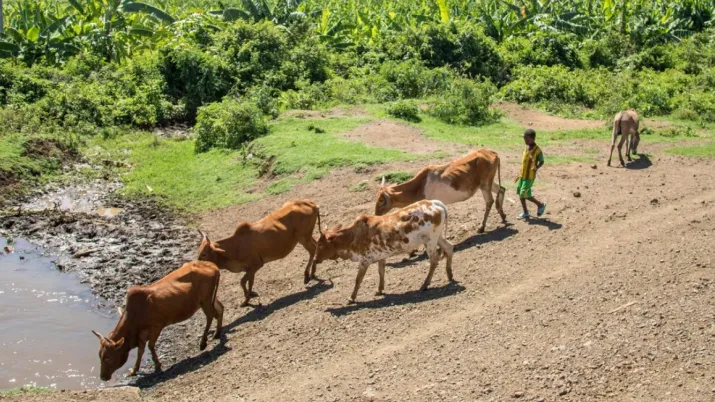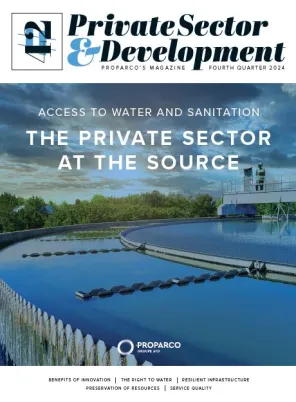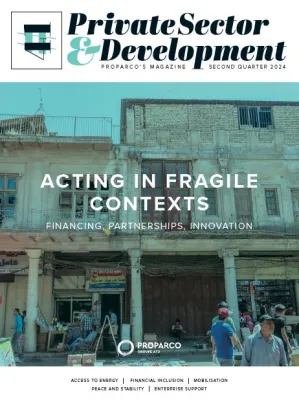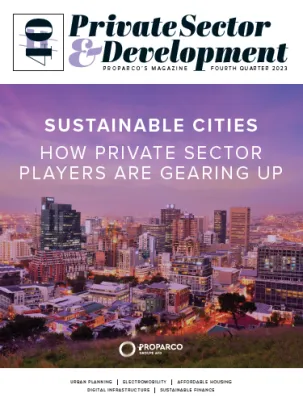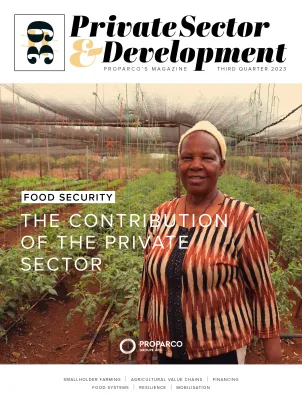Share the page
DFIs’ key role in climate-change resilience
Published on
Chiara Trabacchi Climate change manager British International Investment

Private Sector & Development #43 - European development finance institutions: strategic players in changing times
Proparco is publishing the 43rd edition of its Private Sector & Development magazine, focused on the action of European development finance institutions (DFIs).
The climate challenge is daunting but technological progress and cost reductions are opening new investment opportunities all the time. We can look forward to a golden decade of climate investing.
It is easy to fall prey to pessimism. The consequences of global warming are increasingly evident; greenhouse emissions continue to rise; and as demonstrated at COP29 (2024), the global coalition for action is teetering. To counter this, the 2025 Fourth International Conference on Financing for Development (FfD4) must aim for consensus and make real action commitments. On finance and looking to solutions, there are abundant opportunities ahead to mitigate and adapt to climate change. Development Finance institutions (DFIs) are playing a big role in catalysing climate investing, with new opportunities emerging constantly. The underlying reasons for optimism are technological innovations and cost reductions, making investments to decarbonise economies and adapt to the changing climate increasingly commercially attractive. The first job of DFIs is to help markets in the early stages – supporting pioneering climate
technologies and business models – and to invest in more established technologies (e.g. wind and solar) in countries where private markets are relatively immature. Such investments are set to dominate climate finance in the near term: renewable energy
generation, transmission and storage in the largest and most emissive middle-income economies. Examples are the Suez wind project in Egypt (financed by a consortium of DFIs) and South Africa’s Red Sands standalone battery project (by Globeleq, co-owned by BII and Norfund). The second job of DFIs is to facilitate private investment in projects such as these and their respective markets. Here, blended finance tools can bring opportunities in line with institutional investors’ risk-return requirements. Investments in energy systems are the most visible, but they are just the beginning of what DFIs can deliver. Climate investing needs to permeate every aspect of economies. Four areas stand out however: innovation, the financial sector, nature-based solutions, and adaptation and resilience.
DFIs as launchpads for private investment
Because DFIs exist to take risk for development they are ideal supporters of venture capital funds and other early-stage investment vehicles. These, in turn, back the entrepreneurs pioneering new climate technologies and business models. DFIs can also help green local financial sectors by supporting banks and other financial actors to introduce and grow new climate lending lines, by offering both technical assistance and capital for on-lending, on terms that share the risks and incentivise climate investments. Another important challenge is biodiversity protection and restoration. Already, DFIs are the most significant supporters of sustainable forestry in many
countries, and are well-placed to support new enterprises to seize opportunities for nature-based solutions, created by the voluntary carbon credit trading framework, agreed at last year’s COP. Finally, there is the enormous opportunity of “adaptation and resilience” (A&R). While many investments needed to help society and ecosystems to adapt to climate change fall within the public sector, A&R is also a commercial proposition. Businesses must protect their activities against climate-related risks, and these investments offer high returns – the Global Commission on Adaptation estimates that cost-benefit ratios are between 2:1 and 10:1. There is an estimated$2trillion market opportunity to meet that demand, which private investors cannot ignore. Not adapting will impact food, water and energy security and economic growth. DFIs are already investing to decarbonise economies and help communities deal with the impacts of climate change. In the coming decade, they must scale up operations to seize additional opportunities.




